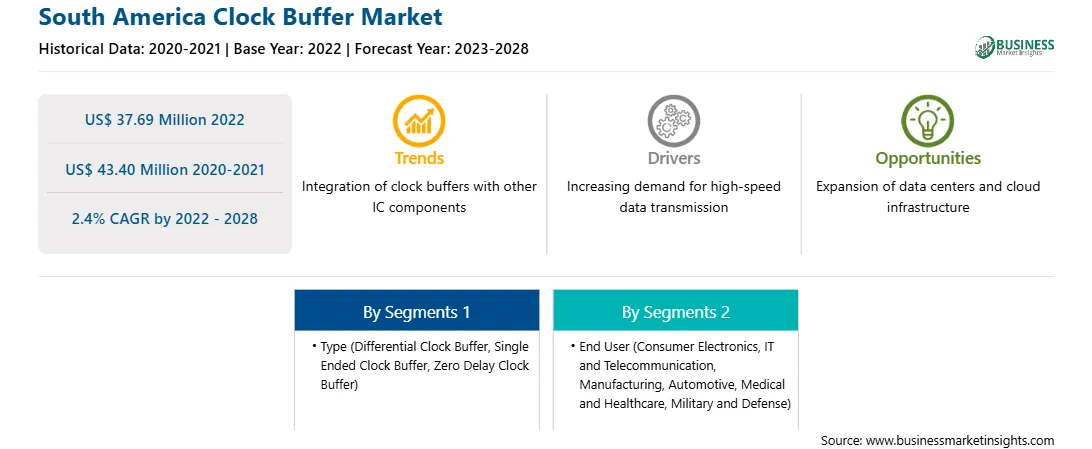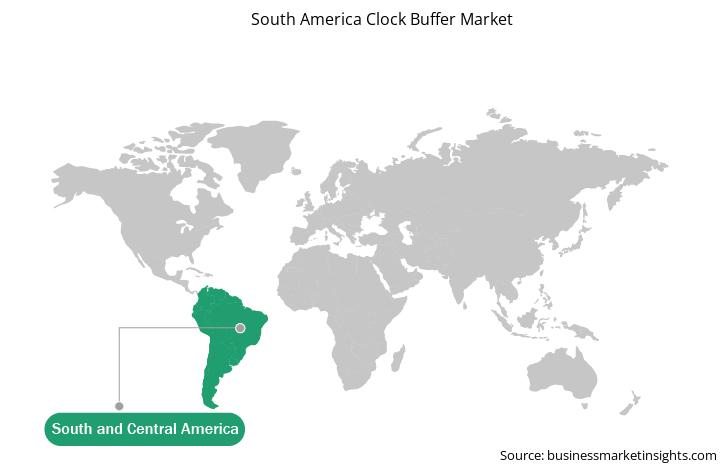The SAM clock buffer market is expected to grow from US$ 37.69 million in 2022 to US$ 43.40 million by 2028; it is estimated to grow at a CAGR of 2.4% from 2022 to 2028.
Consumer electronics devices such as smartphones, laptops, wearables, tablets, and other peripheral devices widely adopt clock buffers. The increasing adoption of consumer electronics products such as smartphones and laptops in developed and developing countries is mainly attributed to rising disposable income, increasing population, and growing internet penetration. The advancement in smartphone technologies and increasing digitalization are significant factors that propel the growth of the clock buffer market. Moreover, the ongoing technological developments are increasing the penetration of these devices across several economies. Buffers are often used to distribute clocks to Analog-to-Digital Convertor (ADCs) connected in parallel to enable higher resolution. In such an application, care must ensure that the channel-to-channel skew satisfies the allowable clock variation, meeting the ADC device aperture delay specifications. When multiple buffers are used, the device-to-device skew for the selected clock distribution buffers becomes important to synchronize the timing across various ADC devices. Clock buffers are one of the most common circuits found in every electronics system. Fanout buffers and clock dividers are general-purpose clock building-block devices that can be used in many applications. They are ideal for clock and signal distribution in various systems, from personal computers to consumer electronics or industrial systems and high-performance networking and communications systems. Thus, the increasing adoption of clock buffer in consumer electronics applications for device interfacing is driving the market growth.
With the new features and technologies, vendors can attract new customers and expand their footprints in emerging markets. This factor is likely to drive the SAM clock buffer market in the coming years. The market is expected to grow at a good CAGR during the forecast period.
Strategic insights for the South America Clock Buffer provides data-driven analysis of the industry landscape, including current trends, key players, and regional nuances. These insights offer actionable recommendations, enabling readers to differentiate themselves from competitors by identifying untapped segments or developing unique value propositions. Leveraging data analytics, these insights help industry players anticipate the market shifts, whether investors, manufacturers, or other stakeholders. A future-oriented perspective is essential, helping stakeholders anticipate market shifts and position themselves for long-term success in this dynamic region. Ultimately, effective strategic insights empower readers to make informed decisions that drive profitability and achieve their business objectives within the market.

| Report Attribute | Details |
|---|---|
| Market size in 2022 | US$ 37.69 Million |
| Market Size by 2028 | US$ 43.40 Million |
| Global CAGR (2022 - 2028) | 2.4% |
| Historical Data | 2020-2021 |
| Forecast period | 2023-2028 |
| Segments Covered |
By Type
|
| Regions and Countries Covered | South and Central America
|
| Market leaders and key company profiles |
The geographic scope of the South America Clock Buffer refers to the specific areas in which a business operates and competes. Understanding local distinctions, such as diverse consumer preferences (e.g., demand for specific plug types or battery backup durations), varying economic conditions, and regulatory environments, is crucial for tailoring strategies to specific markets. Businesses can expand their reach by identifying underserved areas or adapting their offerings to meet local demands. A clear market focus allows for more effective resource allocation, targeted marketing campaigns, and better positioning against local competitors, ultimately driving growth in those targeted areas.

SAM Clock Buffer Market Segmentation
The SAM clock buffer market is segmented based on type, end user, and country. Based on type, the market is segmented into differential clock buffer, single ended clock buffer, and zero delay clock buffer. The differential clock buffer segment dominated the market in 2022 and is expected to be fastest growing during forecast period. Based on end user, the market is segmented into consumer electronics, IT and telecommunication, manufacturing, automotive, medical and healthcare, and military and defense. The consumer electronics segment dominated the market in 2022 and IT and telecommunication segment expected to be fastest growing during forecast period. Based on country, the SAM clock buffer market is segmented into Brazil, Argentina, and Rest of SAM.
Analog Devices Inc.; Diodes Incorporated; Infineon Technologies AG; Microchip Technology Inc.; Renesas Electronics Corporation; Semiconductor Components Industries, LLC; Skyworks Solutions Inc.; and Texas Instruments Incorporated are among the leading companies in the SAM clock buffer market.
The South America Clock Buffer Market is valued at US$ 37.69 Million in 2022, it is projected to reach US$ 43.40 Million by 2028.
As per our report South America Clock Buffer Market, the market size is valued at US$ 37.69 Million in 2022, projecting it to reach US$ 43.40 Million by 2028. This translates to a CAGR of approximately 2.4% during the forecast period.
The South America Clock Buffer Market report typically cover these key segments-
The historic period, base year, and forecast period can vary slightly depending on the specific market research report. However, for the South America Clock Buffer Market report:
The South America Clock Buffer Market is populated by several key players, each contributing to its growth and innovation. Some of the major players include:
The South America Clock Buffer Market report is valuable for diverse stakeholders, including:
Essentially, anyone involved in or considering involvement in the South America Clock Buffer Market value chain can benefit from the information contained in a comprehensive market report.